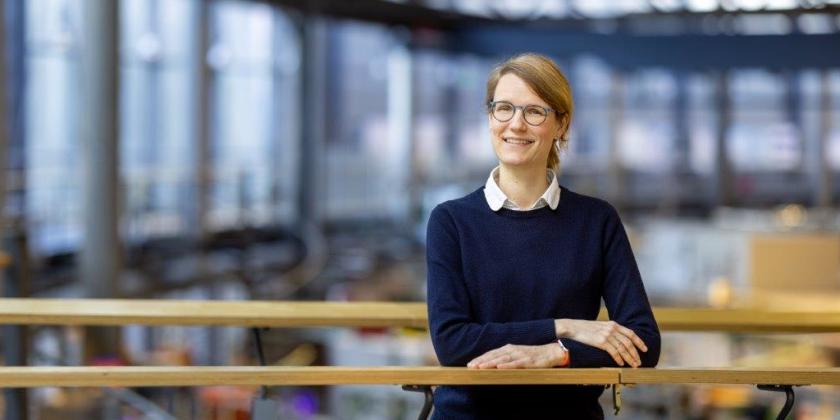TU Berlin appoints Renske van der Veen as professor

Dr. Renske van der Veen investigates catalytic processes at BESSY II, which are crucial for the production of green hydrogen, among other things. © M: Setzpfandt/HZB
For the past two years, Dr Renske van der Veen has led a research group in time-resolved X-ray spectroscopy and electron microscopy at HZB. Her research focuses on catalytic processes that enable, for example, the production of green hydrogen. She has now been appointed to a S-W2 professorship at the Institute of Optics and Atomic Physics (IOAP) at the Technische Universität Berlin.
Dr Renske van der Veen specialises in ultrafast X-ray methods, which she uses at BESSY II to study the fast processes involved in catalysis. Van der Veen is also contributing her expertise to the scientific requirements profile for the successor X-ray source BESSY III.
Renske van der Veen studied at the ETH Zurich and completed her PhD at the École Polytechnique Fédérale de Lausanne (EPFL). She went on to do research at the California Institute of Technology, the Max Planck Institute for Biophysical Chemistry in Göttingen and the University of Illinois, where she was also an assistant professor. She has received the Alexander von Humboldt Foundation's Sofja Kovalevskaja Award and the Packard Fellowship for Science and Engineering.
arö
https://www.helmholtz-berlin.de/pubbin/news_seite?nid=24648;sprache=en
- Copy link
-
Almost 4,000 People at the Long Night of the Sciences at HZB
Helmholtz-Zentrum Berlin was delighted to welcome nearly 4,000 visitors to its Adlershof campus for the Long Night of the Sciences. It was a fantastic celebration of science, and we thank all our guests for their great interest.
-
New Helmholtz Young Investigator Group at HZB on perovskite solar cells
Silvia Mariotti is returning to HZB as head of the new Helmholtz Young Investigator Group ‘Perovskite-based multi-junction solar cells’. The perovskite expert, who was previously based at Okinawa University in Japan, aims to advance the development of multi-junction solar cells made from different perovskite layers.
-
Hydrogen storage in MXene: It all depends on diffusion processes
Two-dimensional (2D) materials such as MXene are of great interest for hydrogen storage. An expert from HZB has investigated the diffusion of hydrogen in MXene using density functional theory. This modelling provides valuable insights into the key diffusion mechanisms and hydrogen's interaction with Ti₃C₂ MXene, offering a solid foundation for further experimental research.
